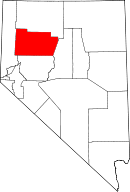Dun Glen, Nevada
Dun Glen (later Chafey) is a ghost town in Pershing County, Nevada, United States, north of the present community of Mill City. Found in 1862, it was a silver mining community founded at a site then within Humboldt County.
Dun Glen
In 1862 the town was founded and soon had a population of 250. It was named after Angus Dunn, its first settler. Early on it was variously called Dunn Glen or Dunglen. However its post office, opened on July 18, 1865 was called Dun Glen, and it operated as such until April 7, 1894.
In 1863 the Sierra Mining district was formed 10 miles northeast of Mill City, with Dun Glen as its business center. In 1863 and 1865 to 1866, at the town's request, a small army garrison was stationed at Camp Dun Glen within the town to protect the miners from Indians in the early part of the Snake War. Dun Glen in the 1860s was one of the largest towns in northern Nevada. By the 1870s it had three stamping mills, but by 1880 mining declined and the population also had declined to 50 persons, supported only by the local cattle ranching in the area. By 1894 it was nearly deserted.
Chafey
However a new silver strike was made in 1908 resulting the creation of a new larger city, Chafey, with a population of 1000 persons, larger than the former town of Dun Glen. Chafey was named after E. S. Chafey, owner of the Chafey Mine. The Chafey post office operated from August 4, 1908 to March 4, 1911, when it was changed to Dun Glen. On April 15, 1913, the post office closed with service transferred to Mill City, when mining operations ceased, and the population again declined and the town was again abandoned.
Mining
The Dun Glen Placer Mine is situated in Pershing County, Nevada, along Dun Glen Creek, which drains from the west side of the East Range Mountains. Reports indicate lode gold was discovered and vein deposits were mined in Dun Glen Canyon during the early 1860s. Chinese miners attempted drift mining of the gold laden placer gravels between 1880 and 1890 with limited success due to the water table. Further exploration of the deposits in the 1920s to 1930’s led to the first mechanized placer operation in 1931. The area has been mined for placer gold since that time and various production totals have been poorly documented.
Remnants
Little is left of the old towns except a few deteriorated stone foundations and dugouts, foundations the stamp mills, a cemetery, tailings from mining operations, and tracks leading to abandoned mines and building sites.
See also
Notes
Bibliography
- Helen S. Carlson, Nevada Place Names: A Geographical Dictionary, University of Nevada Press, 1974. pp. 74, 102
- Dun Glen (Chafee), Nevada Ghost Towns, Published by Robert Jones, P.O. Box 1775, Kennesaw, GA 30156, Copyright 2002, 2008
External links
- Dun Glen Cemetery, Pershing County, Nevada, on interment.net accessed December 24, 2010
- The Daily Henry, Dun Glen
